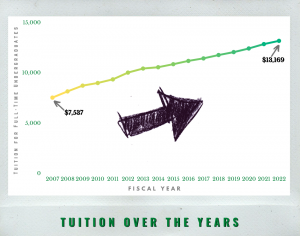Tuition Increased as NJCU Announces $20 Million Deficit
President Sue Henderson Resigns
June 27, 2022
The Board of Trustees voted to increase tuition by three percent today, which was opposed by the voting student representative, at a meeting where they also disclosed a $20 million deficit.
This marks the 17th consecutive tuition increase on record since the fiscal year 2007, based on data from the New Jersey Office of the Secretary of Higher Education. Last year, tuition was increased by 2.5 percent.
Shortly after the meeting, president Sue Henderson sent an email to the NJCU community announcing her resignation. Jason Kroll, vice president and chief strategy officer, will be the interim president, based on an email from Trustees chair Joseph F. Scott.
The Trustees had a “tuition and fees hearing” in April for students to express their thoughts and concerns, but only two students made comments.
At the February Trustees meeting, former chief financial officer (CFO) Jim White said that it was difficult to predict where the university would be by June 30 but that there would most likely be a break-even or slight surplus.
This has proven to not be the case. New CFO Benjamin Durant said at the meeting that NJCU has a $20 million deficit closing out the fiscal year.
“NJCU has been carrying a structural deficit for at least four years,” said Durant.
“One of the main issues that we’re experiencing with this deficit is low cash,” said Durant. He said that it is typical for businesses to have at least 90 days of cash on hand, but NJCU only has 25. Durant said that this will be an area where the university has to “laser focus” on.
“We’re also going to have to right-size the university,” said Durant.
“We are going to have to accept that maybe we are not going to be the school that has 8,000 students anymore, and that’s not necessarily a bad thing. Maybe five or 6000 is the right number.”
Durant explained that the budget and NJCU’s structure is going to have to reflect the decreases in enrollment.
The rpk GROUP was hired by NJCU last year for $210,000 to do an efficiency study on the university. They reported that the school has double the number of managers compared to similar-sized institutions.
NJCU was able to balance its budget for the first time in six years in 2021, according to the report, which was done with a combination of federal COVID aid and making cuts.
“The move to a more sustainable business model requires leadership to confront difficult questions, and to shift toward a more data-informed culture,” said the rpk report. “In the absence of these CV-19-related impacts, the net financial position at NJCU would have been a deficit of $19M.”
Rutgers University also recently announced a tuition increase for the next school year of 2.5 percent after freezing tuition for the 2020-2021 year.















